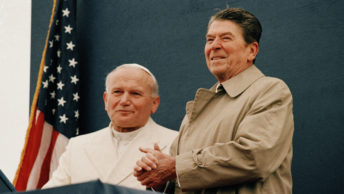Prior to World War II, there were many young people in Germany who belonged to the Nazi youth movement. Some were forced into joining, but most participated quite eagerly and enthusiastically—including a 15-year-old girl named Margaret Mehren. She and her family were atheists, but they needed someone or something to believe in. In the idealism of youth, Margaret was convinced that Adolf Hitler was her country’s savior. After Germany lost the war, however, Margaret learned about the atrocities and mass murders committed by the Nazis under Hitler’s leadership. She was shocked and repulsed, and suddenly realized that instead of being the glorious leader she had thought, Hitler was one of the most wicked persons in history. Feeling betrayed, she vowed never again to believe any adult. It was in this frame of mind that she also began to have doubts about her atheism, since she had learned that from her parents, and so she prayed, “God, if You really do exist, give me some sign.” Margaret came across a Bible. She had tried to read it before, but it made no sense to her. This time, however, when she picked it up and read it, it made perfect sense. As she later explained, “Something happened to me when I read the words of Jesus. I knew He was alive . . . I was no longer alone. My life was no longer a dead-end street.” A few years later Margaret became a Franciscan nun, and later served as a missionary, teaching underprivileged students in South Africa (Mark Link, S.J., Illustrated Sunday Homilies, Year B, Series II, p. 53).
It’s a natural human desire to want to become successful in life, and many times people seek to serve a larger cause, thereby making a difference—but these desires can easily be cheapened or exploited. Quite a few Nazis and Communists managed to combine an evil hatred with a misguided idealism and sincerity, and no doubt this is also true of many terrorists and suicide bombers today. Other people are more concerned with becoming a success in material terms, buying into society’s values and trying to become rich, powerful, and influential. There are those who will work very hard, and make any sacrifice necessary, to achieve success in politics, business or finance, and sports or entertainment, believing that this will truly be best for them and their families. However, all these things can easily lead us in the wrong direction. Many images or voices call out to us, trying to get us to follow them into slavery. Jesus is the only One calling out to us Who seeks to set us free.
God created us for a higher purpose than merely coping with the drudgery of day-to-day existence, or of placing all our hopes in an earthly life of limited duration. Because we can easily become preoccupied with this life, the Lord sends us reminders of what truly matters. As the readings for the Third Sunday in Ordinary Time show, we are blessed when we listen to and act upon His words. The people of Nineveh repented when they heard Jonah’s warning, and as a result, their city was spared. In many ways, the pro-life movement is like a modern-day Jonah, urging our society to repent and to stop the terribly sinful and self-destructive act of abortion—and if our country doesn’t take this warning to heart, it risks the divine judgment that Nineveh escaped.
St. Paul urged the Corinthians to live according to God’s will, for, he said, “the world in its present form is passing away.” Earthly life is inevitably followed by judgment, and it’s our responsibility to be ready. This was also Jesus’ message in the Gospel: “The kingdom of God is at hand. Repent, and believe in the Gospel.” As part of this message, He called Peter and Andrew, and James and John, to become His disciples—and they did. They and the other apostles somehow recognized that following Jesus would set them free, and that they in turn were called to offer this same gift to others.
In his famous book The Power of Positive Thinking, Dr. Norman Vincent Peale tells how he was seated with a married couple in a railway dining car. The wife, who was wearing expensive pearls and a mink coat, was complaining about everything: how the car was dingy and drafty, the service was slow, the food was terrible, and so on. Her husband, however, was friendly, easy-going, and pleasant. Dr. Peale asked the man his occupation, and he answered, “I’m a lawyer,” and then added, “My wife is in the manufacturing business.” Dr. Peale was surprised, for the woman didn’t look like the executive type, so he said, “What does she manufacture?” To the woman’s intense displeasure, the husband answered, “Unhappiness. She manufactures her own unhappiness” (Nelson’s Complete Book of Stories, Illustrations, & Quotes, p. 406).
Our attitude helps determine the sort of life we manufacture or create for ourselves. There have been more than a few cases in which rich, popular, influential people have committed suicide; even though they had every material advantage, they found life oppressive, and felt they had to escape by killing themselves. At the same time, there are people who experience poverty or who carry great burdens, and yet are filled with an inner joy and peace. How is such a contrast possible? Very simply, it’s an openness to, or a rejection of, God’s love that makes the difference. There is a deep longing or need within us, an emptiness in our hearts, which only God can fill. Living for ourselves, and following our own course or direction, will only make it worse. It’s by following Jesus, and by sharing His Gospel with others, that we find true freedom.
Jesus turns the values of our society upside down. For instance, He teaches that it is more blessed to give than to receive; it is better to serve than to be served; it is more important to do what is right and be unpopular or in the minority than to fit in and go along with the crowd in doing something wrong; it is necessary to forgive others, and wrong to take revenge; it is by surrendering our lives to God that we find freedom, and it is by living for ourselves that we find emptiness and slavery.
These are not the sort of truths and values proclaimed by our society, but—as Margaret Mehren learned—a society’s values and beliefs can be terribly wrong and self-destructive. Many of our fellow Americans are giving their allegiance to persons or things which will end up failing or betraying them. Not only must we avoid any form of spiritual or moral slavery, but we must help others discover the truth that can set them free. This was Our Lord’s calling to His first followers, and it remains just as important today. To all who seek true freedom, Jesus says, “Come, follow Me.” This is a simple but essential message which we must do our best to hear and to share.








